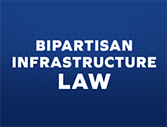Fact Sheet: Joint Development Program

BIPARTISAN INFRASTRUCTURE LAW FACT SHEET
JOINT DEVELOPMENT PROGRAM
Program Purpose:
The Bipartisan Infrastructure Law, enacted as the Infrastructure Investment and Jobs Act (IIJA), continues FTA’s Joint Development program. Joint Development is the coordinated development of transit facilities with non-transit commercial and residential projects. The Joint Development program allows FTA grant recipients to use FTA capital grant program funds or FTA-funded real property for joint development.
Statutory References:
49 U.S.C. § 5302(3)(G) / IIJA § 30001
Eligible Recipients:
An FTA grant recipient may propose a joint development project that either (a) will be financed with an FTA grant, or (b) will make use of project property that is subject to the federal interest. Eligible joint development expenses can be funded through all of FTA’s capital grant programs. FTA-assisted joint developments are subject to the requirements of the FTA grants program through which they received funding.
Eligible Activities:
FTA funds may be used to pay for many aspects of a joint development, including costs associated with eligible planning and capital activities. As required by statute (49 U.S.C. § 5302(3)(G)), joint development projects are eligible for FTA funding if they meet the following eligibility criteria:
- Economic Benefit: Projects must either enhance economic development, or incorporate private investment
- Transit Benefit: Projects must either enhance the effectiveness of transit and be related physically or functionally to public transportation, or establish new or enhanced coordination between public transportation and other transportation
- Fair Share of Revenue: Projects must provide a fair share of revenue that will be used for public transportation.
- Fair Share of Costs: A person making an agreement to occupy space in a transit facility must pay the project sponsor a fair share of the costs of the facility through rental payments and other means. If equipment to fuel privately owned zero-emission passenger vehicles is installed, the recipient of assistance must collect fees from users of the equipment to recover the costs of construction, maintenance, and operation of the equipment.
What’s Changed?
The Bipartisan Infrastructure Law amends 49 U.S.C. § 5302 to include eligibility for electric vehicle charging infrastructure as part of a joint development project, subject to certain conditions. FTA will issue additional guidance on the implementation of this provision.
